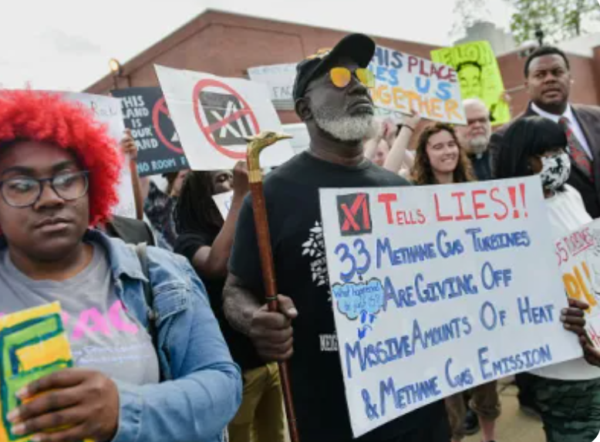Conceived to help accelerate Freedom of Information Act requests, the rule was a key tool in the fight for environmental justice. It helped activists fight big polluters, such as data centers set for construction in Black communities in Memphis and Bessemer, Alabama.
The Biden-era rule sped up the release of public information about polluters, many of whom are operating in Black communities. The Trump administration says the rule is too “woke.”
To help right past wrongs, the Environmental Protection Agency under President Joe Biden changed an obscure bureaucratic rule, allowing the agency to expedite specific requests for government records on polluters operating in low-income Black and Brown communities. Environmentalists called it a useful tool for environmental justice — a way to keep tabs on ind.
But the Trump administration — which has systematically attacked attempts to advance any programs designed to improve racial equity — has decided to undo the rule.
Activists say the change to the Freedom of Information Act rules will make it harder to obtain information about imminent hazards, such as dirty air or water, or unearth plans for environmentally harmful projects. That includes the latest systemic ecological threat to Black communities: data centers.
LEARN MORE: The EPA’s Ability to Kill Climate Justice Gets New Life
In a statement, EPA spokesperson Carolyn Holran said the Biden administration rule is part of a “radical agenda of wasteful DEI programs and ‘environmental justice’” that needed to change. Now, she says, the EPA can refocus on its “core mission of protecting human health and the environment.”
Politico Pro reported the change to the FOIA rules in mid-October, but the FOIA environmental justice provisions are still listed on the EPA website. It’s unclear whether the agency will go through the formal rulemaking process or whether there will be a public comment period.
[The rule change] pulls down a veil of secrecy, obscuring what this administration is actually up to.Matthew Tejada, former EPA OFFICIAL
Supporters say the Biden rule helped inform communities about urgent, harmful environmental conditions, but also set a high bar for expedited FOIA requests.
Matthew Tejada, senior vice president for health at the Natural Resources Defense Council and a former EPA official, told Politico that getting rid of the rule “pulls down a veil of secrecy, obscuring what this administration is actually up to” when it comes to approving potentially harmful projects.
Established in 2023, the rule enabled rushed FOIA requests with fees waived if the applicant could show “a pressing need to inform a community that is potentially experiencing disproportionately high and adverse human health or environmental effects.” However, the applicant would also have to demonstrate an “ability and intention to effectively convey the information to members of the community,” among other justifications.
For example, the nonprofit Waterkeeper Alliance recently submitted an expedited FOIA request regarding the EPA’s move to downgrade standards for drinking water contaminated with so-called “forever chemicals.” If their request was not expedited, the organization wrote, the pollution “could reasonably be expected to pose an imminent threat to health, life, and safety.”
The Trump administration’s decision to eliminate that rule, however, will hamstring activists fighting the construction of data centers in their communities. The EPA is among the federal agencies with the power to approve or reject those projects, depending on its environmental impact.
In Memphis, for example, the “Colossus” project — a gigantic AI supercomputer built by Elon Musk — is facing legal threats and public backlash over pollution from gas turbines powering the facility. Opponents say fumes from the facility foul the air of a nearby Black neighborhood, and Musk has been accused of violating the Clean Air Act. The NAACP announced it intends to sue the EPA for approving the project.
LEARN MORE: Why Are Plans for This Alabama Data Center So Hush-Hush?
And in Bessemer, activists are fighting Project Marvel, a planned AI facility that would consume 700 acres of forest, have a footprint the size of 18 Walmart supercenter stores, and consume enough electricity each year to power a small city. Yet the project, they say, is shrouded in secrecy: several city officials, including the mayor, have signed non-disclosure agreements promising not to discuss the project publicly.
In 2024, Biden’s EPA expedited just 15 FOIA requests and denied requests for nearly 300 others.
Tejada, the NRDC official, says the FOIA rule was far from radical, but its absence will be a problem for neighborhoods that want clean air and water. Now that it’s gone, he said, the Trump administration has ensured “that everyone but the most privileged in our country has few to zero means of engaging our government in a meaningful way,”


